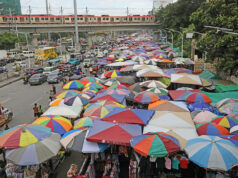BURI disputes ‘misinformation’ by DoTr on malfunctioning in MRT
By Patrizia Paola C. Marcelo
BUSAN UNIVERSAL Rail, Inc. (BURI) in a statement on Monday, Aug. 28, disputed the Department of Transportation’s (DoTr) “misinformation” that the company was to blame for the periodic malfunctioning of the Metro Rail Transit (MRT)-3.

“We seek to correct the misinformation repeatedly being spread by DoTr Undersecretary (Cesar) Chavez. He keeps rehashing the wrong information as if to condition the public into viewing BURI negatively and to baselessly support his unjust plan to terminate BURI’s contract,” the company’s statement read.
BURI said it was referring to remarks made by Mr. Chavez, the DoTr’s Undersecretary for Railways, at a hearing by the House of Representatives last week on the DoTr budget.
The DoTr in January 2016 signed a three-year contract with BURI for MRT-3’s maintenance.
BURI said glitches were also recorded during the time Sumitomo Corp. was handling the train system’s maintenance.
“Even in year 2000, when Sumitomo was maintaining the system in the MRT’s first year of operation, when the trains and rails were brand new and ridership was much less, the MRT already logged 1,492 glitches. That fact shows that the glitches are more reasonably due to design flaws — and not mainly maintenance issues. Through the years, the deterioration of the rails and passenger loading above the intended usage only worsened the system’s condition and resulted in more glitches,” the Filipino-South Korean joint venture said in a statement.
Mr. Chavez told BusinessWorld that the legal office of DoTr is currently reviewing a document from his office regarding plans to terminate the contract with BURI.
Mr. Chavez in a message to reporters also cited the following reasons, regarding the period of January 2016 to June 2017, as to why the contract with BURI should be terminated: failure to maintain safe and reliable train availability, going by six derailment incidents; failure to maintain the required number of efficient trains as evidenced by 98 service interruptions and 833 passenger unloading incidents; failure to prepare feasible procurement plans for spare parts; failure to maintain up-to-date maintenance and repair records; and failure to implement safety standards and regulations for personnel.
The company also said: “To set the record straight, it is untrue that BURI has not been procuring proper spare parts. When BURI started its contract in January 2016, only 40 of MRT’s 72 cars were running. These 40 cars were enough for only 13 three-car trains. The other cars were inoperable and had many missing parts…Since then, BURI fixed 28 cars to presently deliver the contract minimum of 18 trains for revenue operation.”
The company also denied it was supplying “fake parts” to the MRT-3.
“BURI clarifies that it has not supplied any fake part to the MRT-3. BURI is moving forward to meet its commitment (to) train reliability, and safety and comfort for the ridership,” BURI said.



